Paper Menu >>
Journal Menu >>
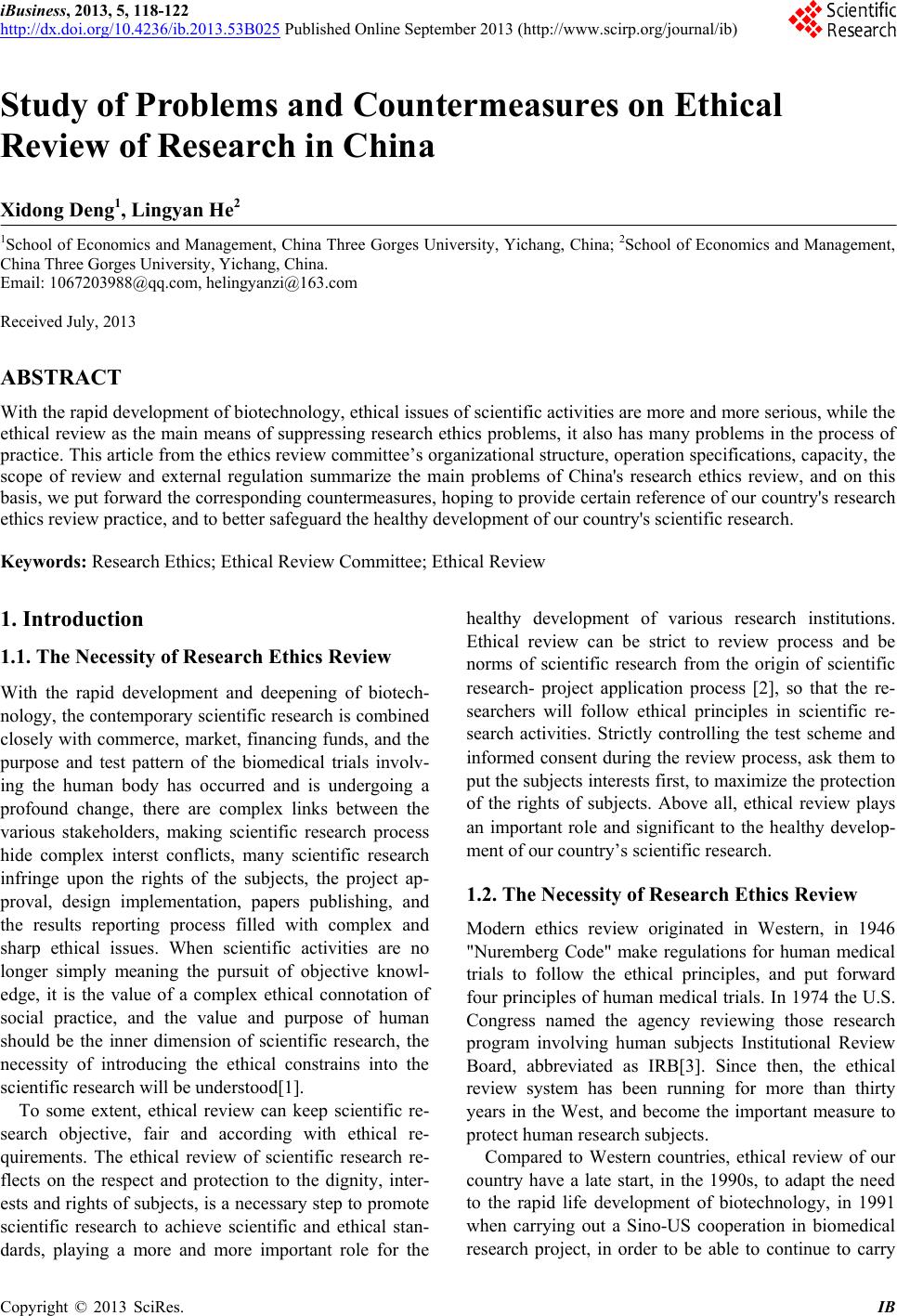 iBusiness, 2013, 5, 118-122 http://dx.doi.org/10.4236/ib.2013.53B025 Published Online September 2013 (http://www.scirp.org/journal/ib) Study of Problems and Countermeasures on Ethical Review of Research in China Xidong Deng1, Lingyan He2 1School of Economics and Management, China Three Gorges University, Yichang, China; 2School of Economics and Management, China Three Gorges University, Yichang, China. Email: 1067203988@qq.com, helingyanzi@163.com Received July, 2013 ABSTRACT With the rapid development of biotechnology, ethical issues of scientific activ ities are mo re and more serious, while the ethical review as the main means of suppressing research ethics problems, it also has many problems in the process of practice. This article from the ethics review committee’s organizational structure, operation specifications, capacity, the scope of review and external regulation summarize the main problems of China's research ethics review, and on this basis, we put forward the corresponding countermeasures, hoping to provide certain reference of our country's research ethics review practice, and to better safeguard the healthy development of our country's scientific research. Keywords: Research Ethics; Ethical Review Committee; Ethical Review 1. Introduction 1.1. The Necessity of Research Ethics Review With the rapid development and deepening of biotech- nology, the contemporary scientific research is combined closely with commerce, market, financing funds, and the purpose and test pattern of the biomedical trials involv- ing the human body has occurred and is undergoing a profound change, there are complex links between the various stakeholders, making scientific research process hide complex interst conflicts, many scientific research infringe upon the rights of the subjects, the project ap- proval, design implementation, papers publishing, and the results reporting process filled with complex and sharp ethical issues. When scientific activities are no longer simply meaning the pursuit of objective knowl- edge, it is the value of a complex ethical connotation of social practice, and the value and purpose of human should be the inner dimension of scientific research, the necessity of introducing the ethical constrains into the scientific research will be understood[1]. To some extent, ethical review can keep scientific re- search objective, fair and according with ethical re- quirements. The ethical review of scientific research re- flects on the respect and protection to the dignity, inter- ests and rights of subjects, is a necessary step to promote scientific research to achieve scientific and ethical stan- dards, playing a more and more important role for the healthy development of various research institutions. Ethical review can be strict to review process and be norms of scientific research from the origin of scientific research- project application process [2], so that the re- searchers will follow ethical principles in scientific re- search activities. Strictly controlling the test scheme and informed consent during the review process, ask them to put the subjects interests first, to maximize the protection of the rights of subjects. Above all, ethical review plays an important role and significant to the healthy develop- ment of our country’s scientific research. 1.2. The Necessity of Research Ethics Review Modern ethics review originated in Western, in 1946 "Nuremberg Code" make regulations for human medical trials to follow the ethical principles, and put forward four principles of human medical trials. In 1974 the U.S. Congress named the agency reviewing those research program involving human subjects Institutional Review Board, abbreviated as IRB[3]. Since then, the ethical review system has been running for more than thirty years in the West, and become the important measure to protect human research subjects. Compared to Western countries, ethical review of our country have a late start, in the 1990s, to adapt the need to the rapid life development of biotechnology, in 1991 when carrying out a Sino-US cooperation in biomedical research project, in order to be able to continue to carry Copyright © 2013 SciRes. IB 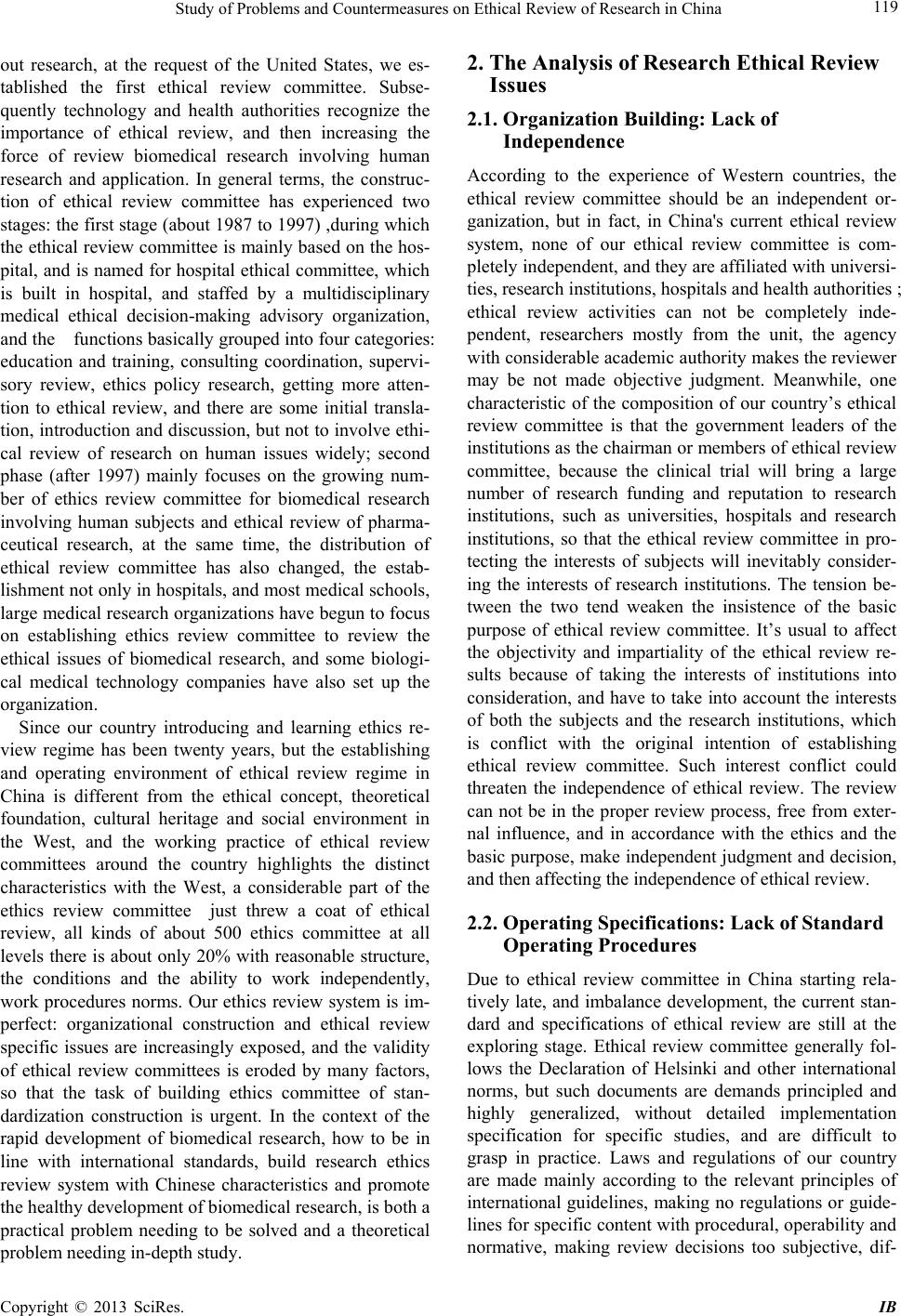 Study of Problems and Countermeasures on Ethical Review of Research in China 119 out research, at the request of the United States, we es- tablished the first ethical review committee. Subse- quently technology and health authorities recognize the importance of ethical review, and then increasing the force of review biomedical research involving human research and application. In general terms, the construc- tion of ethical review committee has experienced two stages: the first stage (abou t 1987 to 1997) ,during which the ethical review committee is mainly based on the hos- pital, and is named for ho spital ethical committee, which is built in hospital, and staffed by a multidisciplinary medical ethical decision-making advisory organization, and the functions basically grouped into four categories: education and training, consulting coordination, supervi- sory review, ethics policy research, getting more atten- tion to ethical review, and there are some initial transla- tion, introduction and discussion, but not to involve ethi- cal review of research on human issues widely; second phase (after 1997) mainly focuses on the growing num- ber of ethics review committee for biomedical research involving human subjects and ethical review of pharma- ceutical research, at the same time, the distribution of ethical review committee has also changed, the estab- lishment not only in hosp itals, and most medical schools, large medical research organizations have begun to focus on establishing ethics review committee to review the ethical issues of biomedical research, and some biologi- cal medical technology companies have also set up the organization. Since our country introducing and learning ethics re- view regime has been twenty years, but the establishing and operating environment of ethical review regime in China is different from the ethical concept, theoretical foundation, cultural heritage and social environment in the West, and the working practice of ethical review committees around the country highlights the distinct characteristics with the West, a considerable part of the ethics review committee just threw a coat of ethical review, all kinds of about 500 ethics committee at all levels there is about only 20% with reasonable structure, the conditions and the ability to work independently, work procedures norms. Our ethics review system is im- perfect: organizational construction and ethical review specific issues are increasingly exposed, and the validity of ethical review committees is eroded by many factors, so that the task of building ethics committee of stan- dardization construction is urgent. In the context of the rapid development of biomedical research, how to be in line with international standards, build research ethics review system with Chinese characteristics and promote the healthy development of biomedical research, is both a practical problem needing to be solved and a theoretical problem needing in-depth study. 2. The Analysis of Research Ethical Review Issues 2.1. Organization Building: Lack of Independence According to the experience of Western countries, the ethical review committee should be an independent or- ganization, but in fact, in China's current ethical review system, none of our ethical review committee is com- pletely independ ent, and they are affiliated with universi- ties, research institution s, hospitals and health authorities ; ethical review activities can not be completely inde- pendent, researchers mostly from the unit, the agency with considerable acad emic authority makes the reviewer may be not made objective judgment. Meanwhile, one characteristic of the composition of our country’s ethical review committee is that the government leaders of the institutions as the chairman or members of ethical review committee, because the clinical trial will bring a large number of research funding and reputation to research institutions, such as universities, hospitals and research institutions, so that the ethical review committee in pro- tecting the interests of subjects will inevitably consider- ing the interests of research institutions. The tension be- tween the two tend weaken the insistence of the basic purpose of ethical review committee. It’s usual to affect the objectivity and impartiality of the ethical review re- sults because of taking the interests of institutions into consideration, and have to take into account the interests of both the subjects and the research institutions, which is conflict with the original intention of establishing ethical review committee. Such interest conflict could threaten the independence of ethical review. The review can not be in the proper review process, free from exter- nal influence, and in accordance with the ethics and the basic purpose, make independent judgment and decision, and then affecting the independence of ethical review. 2.2. Operating Specifications: Lack of Standard Operating Procedures Due to ethical review committee in China starting rela- tively late, and imbalance development, the current stan- dard and specifications of ethical review are still at the exploring stage. Ethical review committee generally fol- lows the Declaration of Helsinki and other international norms, but such documents are demands principled and highly generalized, without detailed implementation specification for specific studies, and are difficult to grasp in practice. Laws and regulations of our country are made mainly according to the relevant principles of international guidelines, making no regulations or guide- lines for specific conten t with procedural, operability and normative, making review decisions too subjective, dif- Copyright © 2013 SciRes. IB 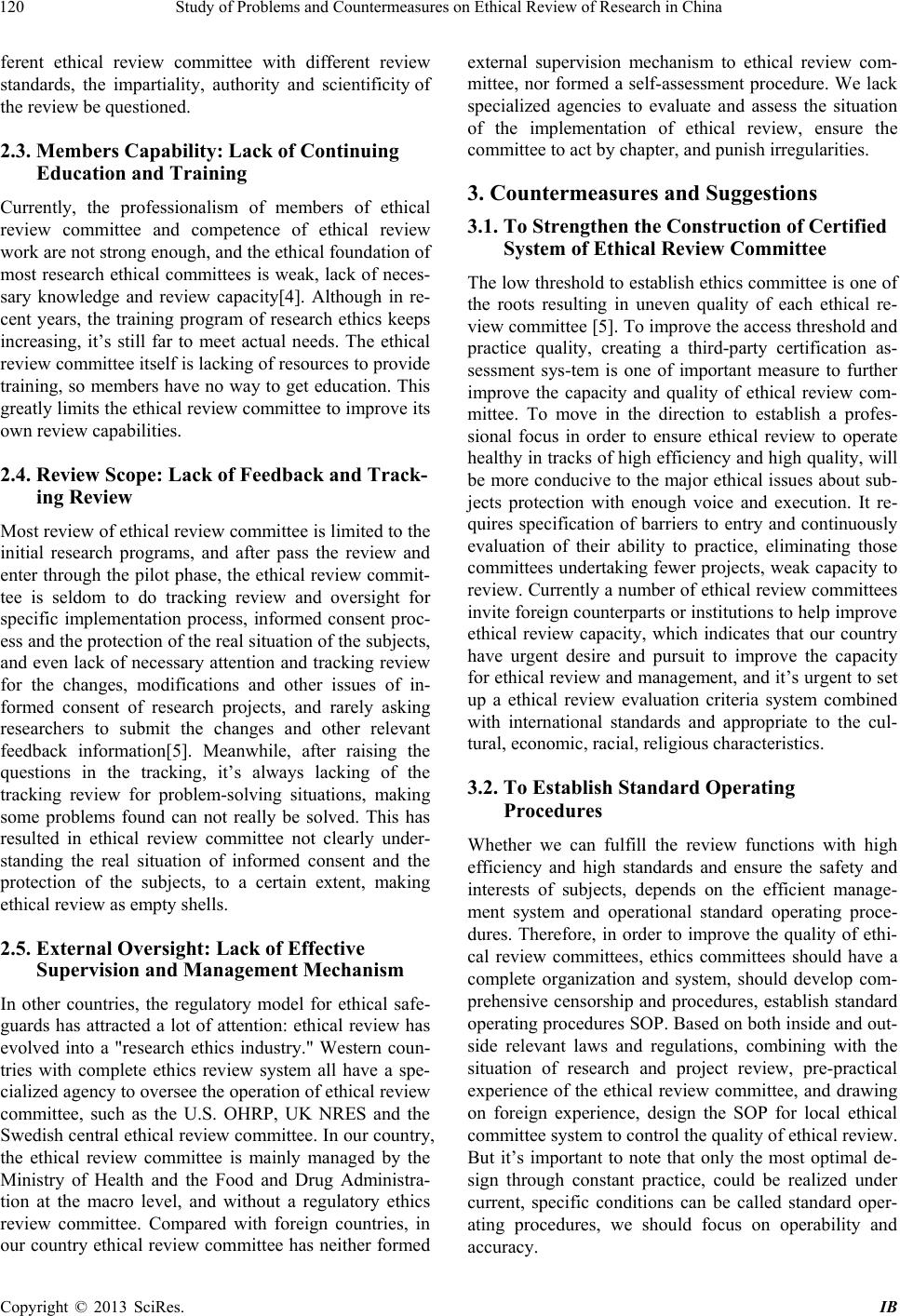 Study of Problems and Countermeasures on Ethical Review of Research in China 120 ferent ethical review committee with different review standards, the impartiality, authority and scientificity of the review be questioned. 2.3. Members Capability: Lack of Continuing Education and Training Currently, the professionalism of members of ethical review committee and competence of ethical review work are not strong en ough, an d the ethical fo undatio n of most research ethical committees is weak, lack of neces- sary knowledge and review capacity[4]. Although in re- cent years, the training program of research ethics keeps increasing, it’s still far to meet actual needs. The ethical review committee itself is lacking of resources to provide training, so members have no way to get education. This greatly limits the ethical review committee to improve its own review capabilities. 2.4. Review Scope: Lack of Feedback and Track- ing Review Most review of ethical review committee is limited to the initial research programs, and after pass the review and enter through the pilot ph ase, the ethical review commit- tee is seldom to do tracking review and oversight for specific implementation process, informed consent proc- ess and the protection of th e real situation of the subjects, and even lack of necessary attention and tracking review for the changes, modifications and other issues of in- formed consent of research projects, and rarely asking researchers to submit the changes and other relevant feedback information[5]. Meanwhile, after raising the questions in the tracking, it’s always lacking of the tracking review for problem-solving situations, making some problems found can not really be solved. This has resulted in ethical review committee not clearly under- standing the real situation of informed consent and the protection of the subjects, to a certain extent, making ethical review as empty shells. 2.5. External Oversight: Lack of Effective Supervision and Management Mechanism In other countries, the regulatory model for ethical safe- guards has attracted a lot of attention: ethical review has evolved into a "research ethics industry." Western coun- tries with complete ethics review system all have a spe- cialized agency to oversee the operation of ethical review committee, such as the U.S. OHRP, UK NRES and the Swedish central ethical review committee. In our country, the ethical review committee is mainly managed by the Ministry of Health and the Food and Drug Administra- tion at the macro level, and without a regulatory ethics review committee. Compared with foreign countries, in our country ethical review committee has neither formed external supervision mechanism to ethical review com- mittee, nor formed a self-assessment procedure. We lack specialized agencies to evaluate and assess the situation of the implementation of ethical review, ensure the committee to act by chapter, and punish irregularities. 3. Countermeasures and Suggestions 3.1. To Strengthen the Construction of Certified System of Ethical Review Committee The low threshold to establish ethics committee is one of the roots resulting in uneven quality of each ethical re- view committee [5]. To improve the access threshold and practice quality, creating a third-party certification as- sessment sys-tem is one of important measure to further improve the capacity and quality of ethical review com- mittee. To move in the direction to establish a profes- sional focus in order to ensure ethical review to operate healthy in tracks of high efficiency and high quality, will be more conducive to the major eth ical issues about sub- jects protection with enough voice and execution. It re- quires specification of barriers to entry and continuously evaluation of their ability to practice, eliminating those committees undertaking fewer projects, weak capacity to review. Currently a number of ethical review committees invite foreign counterparts or in stitutions to help improve ethical review capacity, which indicates that our country have urgent desire and pursuit to improve the capacity for ethical review and management, and it’s urgent to set up a ethical review evaluation criteria system combined with international standards and appropriate to the cul- tural, economic, racial, religious characteristics. 3.2. To Establish Standard Operating Procedures Whether we can fulfill the review functions with high efficiency and high standards and ensure the safety and interests of subjects, depends on the efficient manage- ment system and operational standard operating proce- dures. Therefore, in order to improve the quality of ethi- cal review committees, ethics committees should have a complete organization and system, should develop com- prehensive censorship and procedures, establish standard operating procedures SOP. Based on both inside and out- side relevant laws and regulations, combining with the situation of research and project review, pre-practical experience of the ethical review committee, and drawing on foreign experience, design the SOP for local ethical committee system to control the quality of ethical review. But it’s important to note that only the most optimal de- sign through constant practice, could be realized under current, specific conditions can be called standard oper- ating procedures, we should focus on operability and accuracy. Copyright © 2013 SciRes. IB 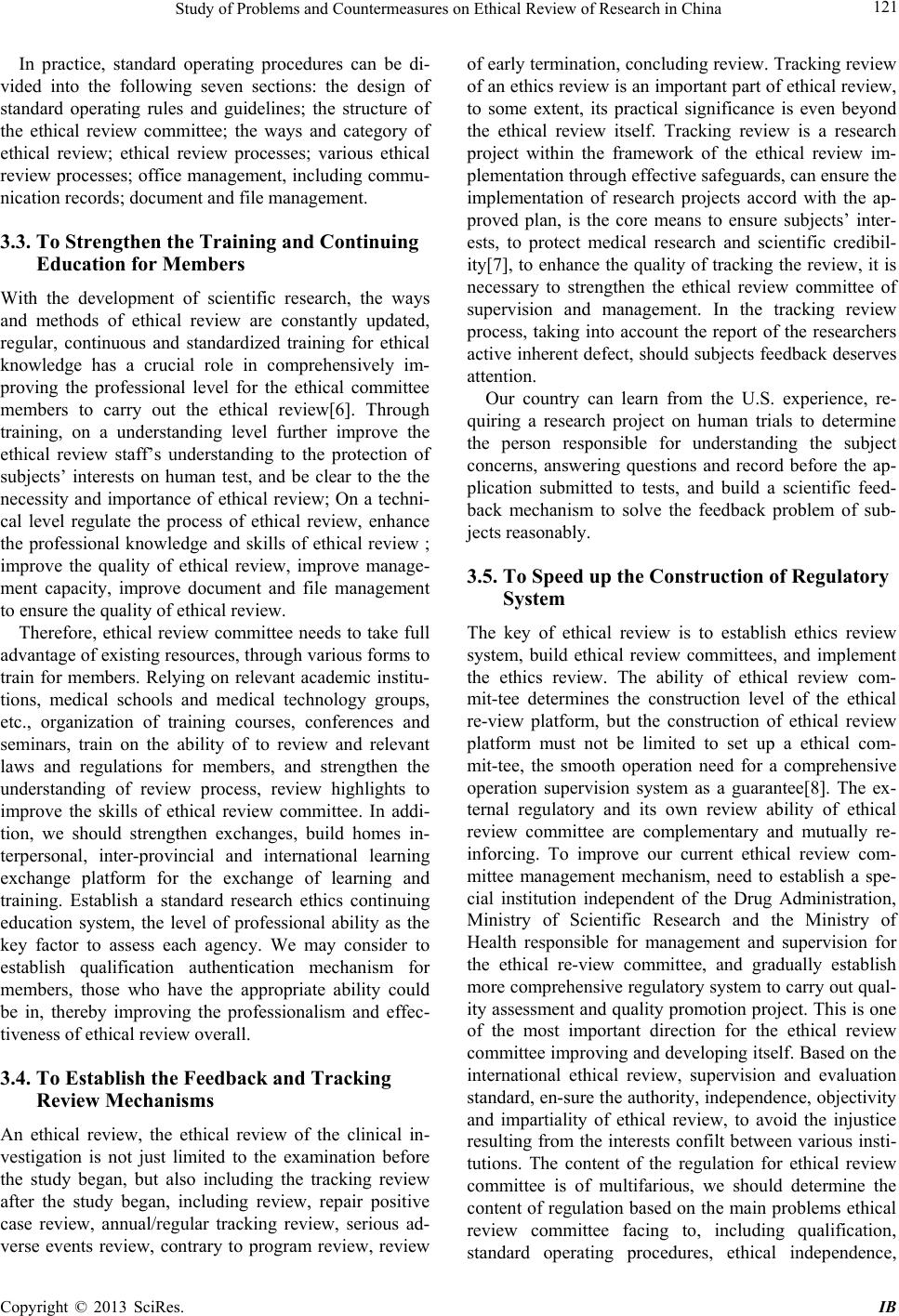 Study of Problems and Countermeasures on Ethical Review of Research in China 121 In practice, standard operating procedures can be di- vided into the following seven sections: the design of standard operating rules and guidelines; the structure of the ethical review committee; the ways and category of ethical review; ethical review processes; various ethical review processes; office management, including commu- nication records; document and file management. 3.3. To Strengthen the Training and Continuing Education for Members With the development of scientific research, the ways and methods of ethical review are constantly updated, regular, continuous and standardized training for ethical knowledge has a crucial role in comprehensively im- proving the professional level for the ethical committee members to carry out the ethical review[6]. Through training, on a understanding level further improve the ethical review staff’s understanding to the protection of subjects’ interests on human test, and be clear to the the necessity and importance of ethical review; On a techni- cal level regulate the process of ethical review, enhance the professional knowledge and skills of ethical review ; improve the quality of ethical review, improve manage- ment capacity, improve document and file management to ensure the quality of ethical review. Therefore, ethical review committee needs to take full advantage of existing resources, through various forms to train for members. Relying on relevant academic institu- tions, medical schools and medical technology groups, etc., organization of training courses, conferences and seminars, train on the ability of to review and relevant laws and regulations for members, and strengthen the understanding of review process, review highlights to improve the skills of ethical review committee. In addi- tion, we should strengthen exchanges, build homes in- terpersonal, inter-provincial and international learning exchange platform for the exchange of learning and training. Establish a standard research ethics continuing education system, the level of professional ability as the key factor to assess each agency. We may consider to establish qualification authentication mechanism for members, those who have the appropriate ability could be in, thereby improving the professionalism and effec- tiveness of ethical review overall. 3.4. To Establish the Feedback and Tracking Review Mechanisms An ethical review, the ethical review of the clinical in- vestigation is not just limited to the examination before the study began, but also including the tracking review after the study began, including review, repair positive case review, annual/regular tracking review, serious ad- verse events review, contrary to program review, review of early termination, concluding review. Tracking review of an ethics review is an important part of ethical review, to some extent, its practical significance is even beyond the ethical review itself. Tracking review is a research project within the framework of the ethical review im- plementation through effective safeguards, can ensure the implementation of research projects accord with the ap- proved plan, is the core means to ensure subjects’ inter- ests, to protect medical research and scientific credibil- ity[7], to enhance the quality of tracking the review, it is necessary to strengthen the ethical review committee of supervision and management. In the tracking review process, taking into account the report of the researchers active inherent defect, should subjects feedback deserves attention. Our country can learn from the U.S. experience, re- quiring a research project on human trials to determine the person responsible for understanding the subject concerns, answering questions and record before the ap- plication submitted to tests, and build a scientific feed- back mechanism to solve the feedback problem of sub- jects reasonably. 3.5. To Speed up the Construction of Regulatory System The key of ethical review is to establish ethics review system, build ethical review committees, and implement the ethics review. The ability of ethical review com- mit-tee determines the construction level of the ethical re-view platform, but the construction of ethical review platform must not be limited to set up a ethical com- mit-tee, the smooth operation need for a comprehensive operation supervision system as a guarantee[8]. The ex- ternal regulatory and its own review ability of ethical review committee are complementary and mutually re- inforcing. To improve our current ethical review com- mittee management mechanism, need to establish a spe- cial institution independent of the Drug Administration, Ministry of Scientific Research and the Ministry of Health responsible for management and supervision for the ethical re-view committee, and gradually establish more comprehensive regulatory system to carry out qual- ity assessment and quality promotio n project. This is one of the most important direction for the ethical review committee improving and d eveloping itself. Based on the international ethical review, supervision and evaluation standard, en-sure the authority, ind ependence, objectivity and impartiality of ethical review, to avoid the injustice resulting from the interests confilt between various insti- tutions. The content of the regulation for ethical review committee is of multifarious, we should determine the content of regulation based on the main problems ethical review committee facing to, including qualification, standard operating procedures, ethical independence, Copyright © 2013 SciRes. IB 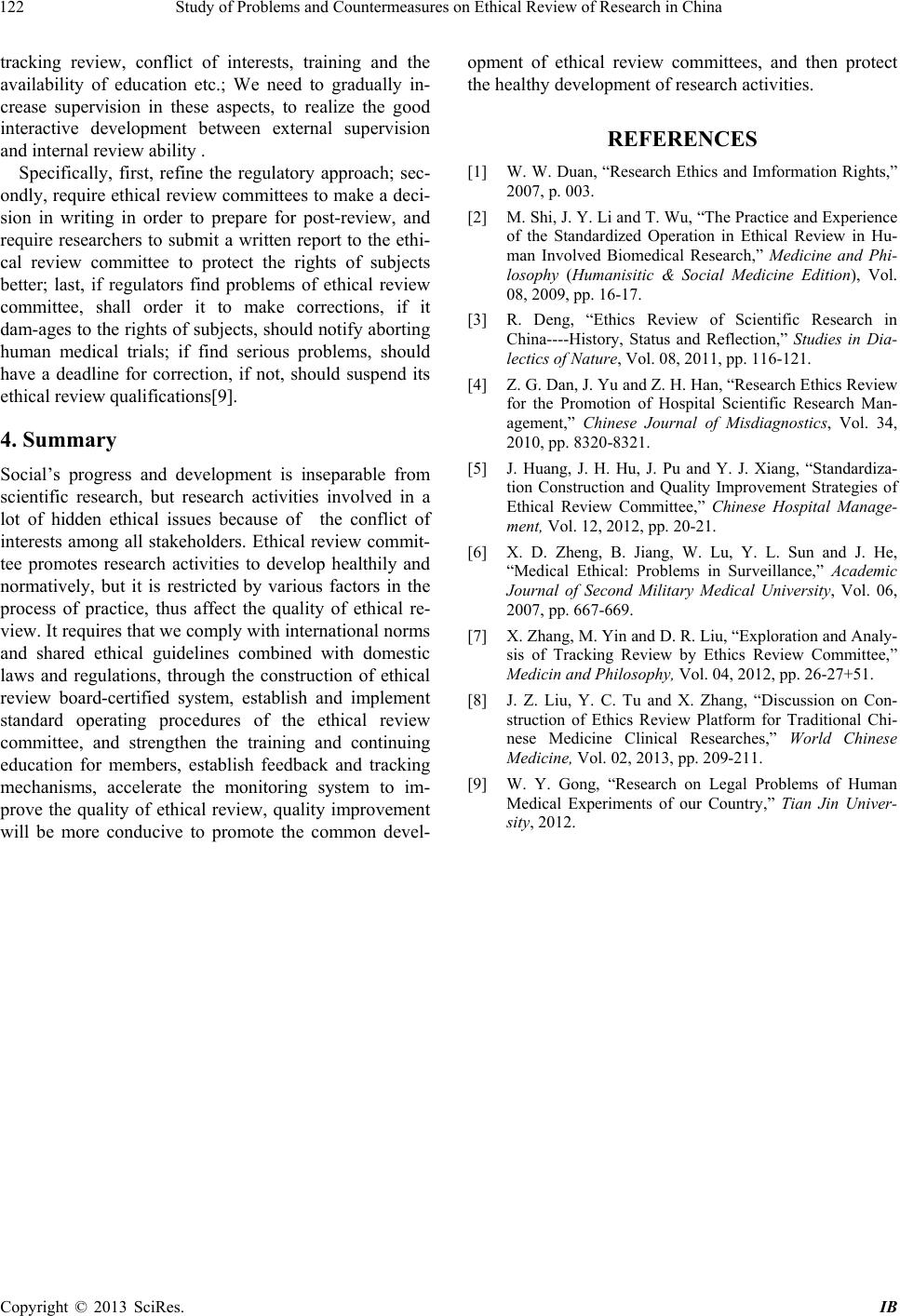 Study of Problems and Countermeasures on Ethical Review of Research in China Copyright © 2013 SciRes. IB 122 tracking review, conflict of interests, training and the availability of education etc.; We need to gradually in- crease supervision in these aspects, to realize the good interactive development between external supervision and internal review ability . Specifically, first, refine the regulatory approach; sec- ondly, require ethical review committees to make a deci- sion in writing in order to prepare for post-review, and require researchers to submit a written report to the ethi- cal review committee to protect the rights of subjects better; last, if regulators find problems of ethical review committee, shall order it to make corrections, if it dam-ages to the rights of subjects, shou ld notify aborting human medical trials; if find serious problems, should have a deadline for correction, if not, should suspend its ethical review qualifications[9]. 4. Summary Social’s progress and development is inseparable from scientific research, but research activities involved in a lot of hidden ethical issues because of the conflict of interests among all stakeholders. Ethical review commit- tee promotes research activities to develop healthily and normatively, but it is restricted by various factors in the process of practice, thus affect the quality of ethical re- view. It requires that we comply with international norms and shared ethical guidelines combined with domestic laws and regulations, through the construction of ethical review board-certified system, establish and implement standard operating procedures of the ethical review committee, and strengthen the training and continuing education for members, establish feedback and tracking mechanisms, accelerate the monitoring system to im- prove the quality of ethical review, quality improvement will be more conducive to promote the common devel- opment of ethical review committees, and then protect the healthy development of research activities. REFERENCES [1] W. W. Duan, “Research Ethics and Imformation Rights,” 2007, p. 003. [2] M. Shi, J. Y. Li and T. Wu, “The Practice and Experience of the Standardized Operation in Ethical Review in Hu- man Involved Biomedical Research,” Medicine and Phi- losophy (Humanisitic & Social Medicine Edition), Vol. 08, 2009, pp. 16-17. [3] R. Deng, “Ethics Review of Scientific Research in China----History, Status and Reflection,” Studies in Dia- lectics of Nature, Vol. 08, 2011, pp. 116-121. [4] Z. G. Dan, J. Yu and Z. H. Han, “Research Ethics Review for the Promotion of Hospital Scientific Research Man- agement,” Chinese Journal of Misdiagnostics, Vol. 34, 2010, pp. 8320-8321. [5] J. Huang, J. H. Hu, J. Pu and Y. J. Xiang, “Standardiza- tion Construction and Quality Improvement Strategies of Ethical Review Committee,” Chinese Hospital Manage- ment, Vol. 12, 2012, pp. 20-21. [6] X. D. Zheng, B. Jiang, W. Lu, Y. L. Sun and J. He, “Medical Ethical: Problems in Surveillance,” Academic Journal of Second Military Medical University, Vol. 06, 2007, pp. 667-669. [7] X. Zhang, M. Yin and D. R. Liu, “Exploration and Analy- sis of Tracking Review by Ethics Review Committee,” Medicin and Philosophy, Vol. 04, 2012, pp. 26-27+51. [8] J. Z. Liu, Y. C. Tu and X. Zhang, “Discussion on Con- struction of Ethics Review Platform for Traditional Chi- nese Medicine Clinical Researches,” World Chinese Medicine, Vol. 02, 2013, pp. 209-211. [9] W. Y. Gong, “Research on Legal Problems of Human Medical Experiments of our Country,” Tian Jin Univer- sity, 2012. |

